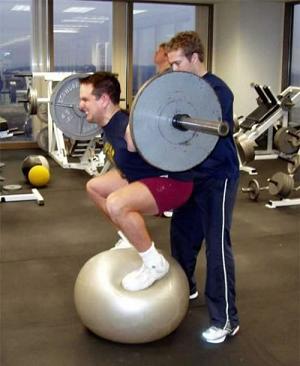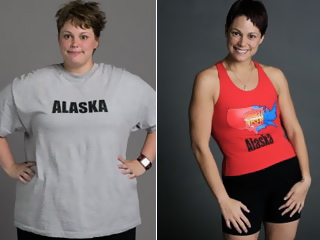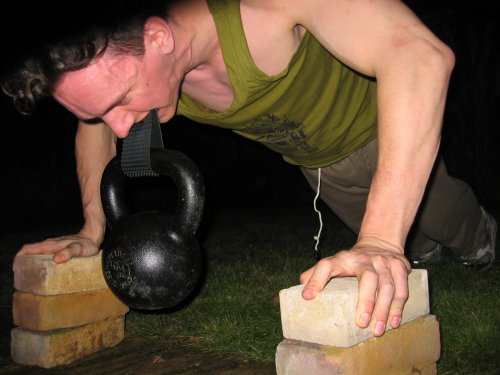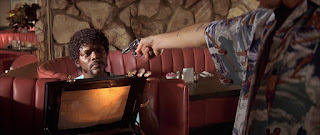Deciding to get a personal trainer can be an amazing investment in your health. Most people haven't made the time investment to become experts in fitness and exercise, and in that case it is very appropriate to hire a trainer to help guide you. Hiring a trainer off the bat can help you save a lot of wasted time if you're not 100% certain what you're doing when you go to the gym.
Whatever the reason or whatever your goal, you've decided you'd like to hire a trainer. But how can you tell if you're getting the best help for your money? Sadly not all trainers are created equal. Personal training isn't the cheapest service around and it would be worth your time to find a trainer who is worth the price. (And trust me, a good trainer is definitely worth it) So here are some keys to look out for when you're shopping around:
Tip #1: NOT THIS GUY
1) Certifications and Degrees
It's an interesting thing about personal training certifications: They mean everything and nothing at the same time. There is no national certifying body for personal trainers like there is for some other professions. Many gyms have their own certification processes that consist only of weekend courses, which is definitely not enough time for someone to be taught and assessed as a proficient trainer. There are hundreds of different certifications that one can get that labels you as a "certified" trainer. This does not mean that the person knows what they are talking about. There are some certifications that are considered more reputable: they cost more to get, cover a lot of material and are, in general, what some of the higher-end gyms and studios look for when hiring a trainer. Some of these certifications to look out for are: NASM, ACSM, ACE and NSCA. CSCS, RKC, MES, LAT or ATC are some more advanced, optional certifications that will probably increase the chances of that person being committed to their profession.
At the same time, just having these certifications is no guarantee that the person knows what they're talking about, will work well with you, is committed to keeping themselves well-educated or is worth your money. As well, simply having a degree from a university in the field doesn't mean that they know how to design a program or teach correct form, but they will be more likely to have a good base understanding in anatomy and physiology, which I believe is integral for anyone who wants to train.
You want a trainer who's book and street smart.
Take a look at this blog post by Nick Tumminello for more information on certifications: http://nicktumminello.com/2011/11/the-truth-about-personal-trainer-certifications/
2) The Assessment
When or even before you hire most trainers, there will be some kind of assessment or consultation. Every trainer will do assessments and consultations differently depending on what information they find useful. But regardless of style, if a trainer does not at least ask you some form of the following questions, you will want to consider looking elsewhere:
-Do you have any medical conditions?
-Do you suffer from any bone or joint problems / pain from any previous injuries?
-Do you take any medications?
-What are your goals? (A fair amount of time should be spent discussing this)
-Do you currently exercise? / Have you exercised or played sports in the past?
Aside from that, most trainers will do some kind of initial assessment to see where you're starting at. Things that are included in these assessments can really vary from trainer to trainer, but a pretty comprehensive assessment will consist of:
-Body composition assessments (Skin fold, circumference, BIA, etc)
-Postural Assessment
A few things we can see in a postural assessment.
-Upper body strength (push-up test, bench press test)
-Lower body strength (leg press)
-Cardiovascular endurance (3-minute step test, 1-mile treadmill walk, etc)
-Flexibility (Too many to list)
-Muscular imbalances (Single-leg squat, squat, overhead squat)
-Balance (Single-leg squat, 1-leg stand with eyes open / closed)
Knee valgus is one of the things we look for in a squat assessment
-Core stability (Bird-dog, plank, toe tap)
I myself usually do a couple body composition tests, a postural assessment, a few flexibility tests, muscular imbalances and core stability. A trainer should put you through at least a few assessments, but which ones they choose will vary based on facility policy and trainer preference. If your goals are physique-related, a body composition test should be done, preferably skin folds or circumference measurements. If you have a lot of aches and pains, a core stability, flexibility and muscular imbalances assessment would be appropriate, etc. If you have no baseline, then how can you know for sure you're making progress?
However, assessing your performance should never stop at the initial assessment. Looking for muscular imbalances, balance issues, inflexibility, etc. should happen every session.
3) Questions to ask your potential trainer
-What is your background in training / how did you get into training?
Asking this can give you a lot of information about your trainer. They'll probably talk about any sports they used to play and at what levels, their certifications and / or degrees, how long they've been working out, what kind of training they specialize in, how long they've been a trainer, what kind of clients they've worked with, and you'll probably be able to tell if they're truly passionate about what they do.
-What is your training philosophy?
Again, this can give you a lot of insight into how your trainer views their job. Preferably you want someone who can talk about the benefits of what they do with their clients, not just how awesome their training style may or may not be. For instance, if I was asked this question I'd probably talk about how I believe strength training is an important element in anyone's workout plan, and why I believe that, as well as how although that is something I'm passionate about, I do incorporate other aspects of fitness to make a well-rounded plan. This would also be an opportune time to ask about how they motivate their clients. If this differs from how you perform best, let them know! It's nice to be told up front that you are best motivated by being yelled at, since that saves us the time of having to figure it out and going through trial and error.
-What would a typical workout with you look like?
Well, hopefully they'd mention that workouts vary from person to person depending on goals and individual needs. But you want to know that your trainer does have a method to how they construct workouts and that they do plan in advance for their clients. Not all trainers do this - some just wing it. You do not want a trainer who 'wings it.' You'll want someone who can explain why they do what they do in layman's terms. This way if you have any concerns about how they do things you can bring them up there and have them laid to rest before you get started.
-Information about fitness and exercise always seems to be changing. How do you stay on top of things?
This is just a nice way of asking your trainer if they strive to continue learning about their profession. The real factor that determines whether you have a truly good trainer on your hands is if they make a big effort to know as much as they possibly can about training and practice what they preach. I spend an embarassing amount of time reading various internet blogs, sites and forums as well as whatever books I can get my hands on about training and to some extent diet. If you've got someone who has practical, hands-on experience in training (preferably by having trained themselves extensively), and who reads a lot, it really doesn't matter what certification they have or where they got their degree. The certification in no way teaches someone everything they need to know to be a good trainer.
4) Things to look out for during a session
-A trainer who texts while they're in a session with you.
I've seen this happen. A lot. Even once is too many times. Save yourself the time and fire them immediately.
Let me just stick you on a machine while I catch up on facebook...
-A trainer who doesn't work around your injuries
If you have a sprained ankle, those suicides are probably not the best idea. If you have a lot of shoulder pain and doing bench press hurts, chances are you're not going to want to do them. If your trainer ignores these complaints entirely it's time to find someone who listens.
-A trainer who can't adjust a workout
Let's say that your trainer has you down for doing some squats one day, but you're not quite yet ready for them, ie. your knees cave in, you can't hit depth, your back rounds, you're not stable, etc. Does your trainer have you continue doing an exercise incorrectly, or do they have you do box squats with a lighter weight, or have you regress the exercise to lunges or goblet squats instead? Did you injure your shoulder in between sessions and now can't do certain exercises? Your trainer needs to care about you doing exercises safely and effectively more than they care about sticking to whatever exercise they had planned out. A good trainer can adjust.
-A trainer who doesn't listen to you
If you bring up concerns during a session your trainer should take them seriously and address them to your satisfaction(unless of course you're asking the same question time and again). This goes along with having a trainer who can give you solid reasoning for whatever you're doing.
-A trainer who listens to you too much
Some people need to be pushed... some harder than others. There is always a client who will pull out every excuse in the book as to why today they really can't run those stairs or squat that weight and a trainer needs to be able to discern when you're actually in pain and when you're just tired. Of course, it's always nice if you're just honest with yourself!
-A trainer who works well with you
Sometimes personalities clash. Sometimes you find that you'd rather work with another trainer in the gym than the one you have. It happens. Just make sure it's not because you want a trainer who will go easier on you. Remember why you hired us in the first place!
Conclusion
So I hope that this post will help you in any kind of decision making towards personal training. I'm sure there are some points I missed or just skimmed over, but this should be a pretty sufficient overview. So good luck to everyone in keeping with your fitness goals this year and the years to come!






















